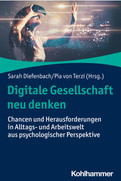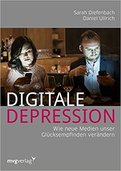Contact
Department of Psychology
Chair of Economic and Organisational Psychology
Leopoldstr. 13
80802 Munich
Germany
Room:
3203
Phone:
+49 (0) 89 / 2180 - 5202
Email:
sarah.diefenbach@psy.lmu.de
Office hours:
by appointment by e-mail
Short Vita
Sarah Diefenbach is professor for Economic Psychology and Human-Computer Interaction at the Ludwig-Maximilians-Universität München (Germany) with a focus on the field of interactive technology. Her research group explores design factors and relevant psychological mechanisms of technologies related to different facets pervasive computing (e.g., smart communication, self-improvement technologies, social media, companion technologies, social robots). Sarah Diefenbach received her doctorate in Psychology with distinction from the University of Koblenz-Landau. Since 2007 she is engaged in research on user experience and consumer experience in the field of interactive products. Current research topics focus on the negative side effects of technology use on happiness and wellbeing ("digital depression"), the psychological effects of social media (e.g., selfie-paradox) as well as interaction design from a psychological perspective (e.g., aesthetics of interaction, psychological needs approach). Sarah Diefenbach developed several methods for user experience design and evaluation (e.g., interaction vocabulary) which are widely applied in research and practice. She has acquired and led a number of interdisciplinary research projects by research foundations (BMBF, DFG) as well as industry partners.
Sarah Diefenbach is an active member of the scientific community, is member of several editorial boards (e.g., i-com – International Journal of Interactive Media), has co-organized several events and conferences (e.g., Usability Professionals, Mensch & Computer) and served as program committee member and reviewer in leading conferences in the field of HCI (e.g., CHI, DIS, Mobile HCI). Her research is internationally published and recognized, including more than 100 articles in books, journals, and conference proceedings. She is an acknowledged speaker with a number of invited talks for keynotes and panel discussions on academic, industry-oriented and cultural events.
Research Topics
Prof. Diefenbach's research focuses on consumer experience in the field of interactive products and the consideration of human-technology interaction from a psychological perspective. This includes, for example, the following topics:
- Effects of Technology on Wellbeing and Social Interaction
- Social Robots and Assistive Technologies
- User Experience Evaluation and Design
- Psychology of Self Improvement and Motivational Products
Teaching
Academic teaching (since 2007) in the fields of market and consumer psychology, psychological product design and human-technology interaction at various universities (LMU München, JMU Würzburg, Folkwang UdK Essen, TU Darmstadt, Universität Koblenz-Landau).
Selected Interviews and Talks (mainly in German language)
- Podcast 'Gesunde Gestaltung', 09/22: "Zur Gestaltung von Erlebnissen, Bedürfnisorientierung und Robotik"
- 'Geht da noch was?'-Optimierungs-Podcast der ZEIT, 08/22: "Wie Sie eine gute Balance zwischen Büro und Homeoffice finden"
- Podcast Deep Dive 06/20: Über den Digitalisierungsschub in der Corona-Pandemie
- ARD alpha Campus Talk, 06/20: "Digitale Etiquette - Technologievermittelte soziale Normkonflikte im Alltag"
- Vortrag Vogue Business 03/17: "Likes" in den sozialen Medien - für viele inzwischen wichtiger als reale Erlebnisse"
- Artikel CBC 02/17: "Selfie Paradox: People want fewer selfies on social media but keep posting selfies themselves"
- Artikel Frontiers Blog, 02/17: "We like taking selfies but not looking at them"
- Interview Wirtschaftswoche, 01/17: "Das Smartphone ist wie ein Glücksspielautomat"
- Interview Tages Anzeiger, 12/16: "Facebook macht unzufrieden"
Selected Research Projects
- BMBF-Project VEREINT - Sich VERbundEn fühlen durch INTeraktive Technologien, supported by BMBF, Bundesministerium für Bildung und Forschung
- BMBF-Project MOVEN - Motivationale und Verhaltensändernde Nachhaltigkeitstechnologien, supported by BMBF, Bundesministerium für Bildung und Forschung
- BMBF-Project Gina – Hochwertig gestaltete Interaktionsstrategien für Service- und Assistenzrobotik, supported by BMBF, Bundesministerium für Bildung und Forschung
- DFG-Project PerforM – Personalities for Machinery in Personal Pervasive Smart Spaces, supported by DFG as part of the SPP "Scalable Interaction Paradigms for Pervasive Computing Environments" (SPP 2199)
- DFG-Project Aesthetics of Performative Interaction for Pervasive Computing Environments in Public Spaces, supported by DFG as part of the SPP "Scalable Interaction Paradigms for Pervasive Computing Environments" (SPP 2199)
- BMBF-Project ProFI - Zielgerichtetes Prototyping für gesteigerte Innovation. supported by BMBF, Bundesministerium für Bildung und Forschung
Selected Publications
|
|
Diefenbach, S. & von Terzi, P. (2022). Digitale Gesellschaft neu denken |
|
Diefenbach, S. (2019). München: Riva. Wieso zwei halbe Stück Kuchen dicker machen als ein ganzes. Psychologische Denkfallen entlarven und überwinden. München: mvg. |
|
|
Diefenbach, S. & Hassenzahl, M. (2017). Psychologie in der nutzerzentrierten Produktgestaltung. Mensch – Technik – Interaktion – Erlebnis. In: F. C. Brodbeck, E. Kirchler, R. Woschee (Eds.) Die Wirtschaftspsychologie. Berlin, Heidelberg: Springer. |
|
Diefenbach, S., & Ullrich, D. (2016). Digitale Depression: Wie neue Medien unser Glücksempfinden verändern. München: mvg. |
- Diefenbach, S. (2022). Social norms in digital spaces: Experience reports on wellbeing and conflict in the teleworking context and implications for design. Zeitschrift für Arbeitswissenschaft. doi:10.1007/s41449-022-00332-8. [Link]
- Diefenbach, S., Christoforakos, L., Ullrich, D., & Butz, A. (2022). Invisible but Understandable: In Search of the Sweet Spot between Technology Invisibility and Transparency in Smart Spaces and Beyond. Multimodal Technologies and Interaction, 6(10), 95. doi: 10.3390/mti6100095 [Link]
- Christoforakos, L. & Diefenbach, S. (2022). Technology as a Social Companion? An Exploration of Individual and Product-Related Factors of Anthropomorphism. Social Science Computer Review. doi: 10.1177/08944393211065867 [Link]
- Tretter, S. & Diefenbach, S. (2021). The Buffer Effect: Strategic Choice of Communication Media and the Moderating Role of Interpersonal Closeness. Journal of Media Psychology. doi: 10.1027/1864-1105/a000320 [Link]
- Gertz, M., Schütz-Bosbach, S., & Diefenbach, S. (2021). Smartphone and the Self: Experimental investigation of self-incorporation of and attachment to smartphones. Multimodal Technologies and Interaction, 5(11), 67; https://doi.org/10.3390/mti5110067 [Link]
- Diefenbach, S. & Anders, L. (2021). The Psychology of Likes: Relevance of Feedback on Instagram and Relationship to Self-esteem and Social Status. Psychology of Popular Media. doi: 10.1037/ppm0000360 [Link]
- von Terzi, P., Tretter, S., Uhde, A., Hassenzahl, M., & Diefenbach, S. (2021). Technology-mediated experiences and social context: Relevant needs in private vs. public interaction and the importance of others for positive affect. Frontiers in Psychology. doi: 10.3389/fpsyg.2021.718315 [Link]
- Ullrich, D., Butz, A., & Diefenbach, S. (2021). The development of overtrust: An empirical simulation and psychological analysis in the context of human-robot interaction. Frontiers in Robotics and AI. doi: 10.3389/frobt.2021.554578 [Link]
- Ullrich, D., Butz, A., & Diefenbach, S. (2020). The eternal robot: Anchoring effects in human's mental models of robots and their self. Frontiers in Robotics and AI. doi: 10.3389/frobt.2020.546724 [Link]
- Diefenbach, S. & Borrmann, K. (2019). The Smartphone as a Pacifier and its Consequences. Young adults' smartphone usage in moments of solitude and correlations to self-reflection. In Proceedings of the 2019 CHI Conference on Human Factors in Computing Systems (paper 306). New York, NY, USA: ACM. doi: 10.1145/3290605.3300536 [Link]
- Diefenbach, S., Christoforakos, L., Maisch, B., Kohler, K. (2019). The State of Prototyping Practice in the Industrial Setting: Potential, Challenges and Implications. In Proceedings of the 22nd International Conference on Engineering Design (ICED19), Delft, The Netherlands, 5-8 August 2019. doi:10.1017/dsi.2019.176 [Link]
- Ullrich, D., Diefenbach, S., Christoforakos, L., Surmava, T., & Quintes, C. (2019). Robotervertrauen: Eine Exploration. doi: 10.18420/muc2019-ws-306-01 [Link]
- Diefenbach, S. & Hassenzahl, M. (2019). Psychology in product design. In: K. Gangl & E. Kirchler (Eds.), A research agenda for economic psychology. Cheltenham, UK: Edward Elgar Publishing. [Link]
- Diefenbach, S. & Müssig, A. (2018). Counterproductive effects of gamification: An analysis on the example of the gamified task manager Habitica. International Journal of Human-Computer Studies. doi: 10.1016/j.ijhcs.2018.09.004 [Link]
Further publications by Prof. Dr. Sarah Diefenbach can be found on Google Scholar.






